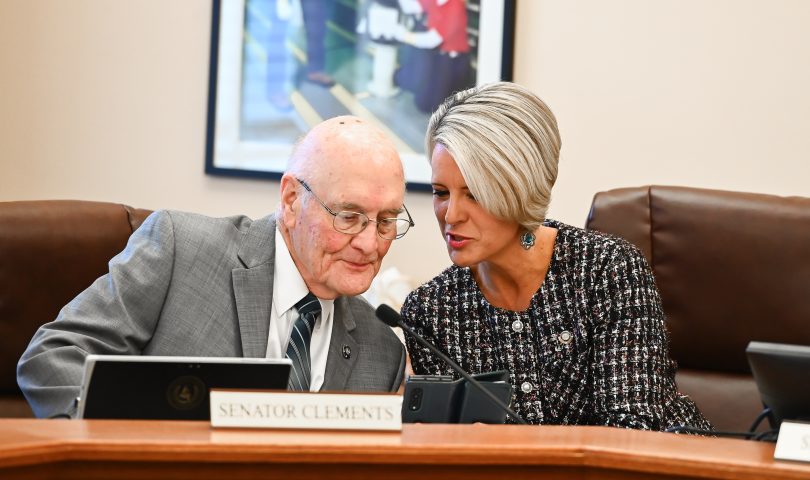MORGANTOWN — Enthusiasm abounded as the Senate Education Committee advanced what they called a “transformational” bill to improve the reading and math skills of the state’s K-3 students.
The emotion was evident but several senators also commented that they were voting “enthusiastically” for SB 274 — the Third Grade Success Act, which now heads to Finance.
The bill’s overarching purpose is to develop a statewide approach to reading and math education.
Teachers will be instructed in what is called the “science of reading,” incorporating phonics, phonemic awareness (the ability to identify and manipulate individual sounds in words), vocabulary, fluency (reading accurately, quickly and with expression), and comprehension. They will be expected to bring these skills to classrooms to change how reading is taught.
Teachers will learn how to use screeners and benchmark assessments in K-3 classrooms to assess reading and math skills and identify such issues as dyslexia and dyscalculia — a math learning disorder — and conduct screenings three times a year in the classrooms. Students with identified issues will be provided intervention and assistance.
Children whose reading deficiencies are not corrected by third grade will be held back unless an exemption is met.
The bill details how families will be engaged in their children’s progress.
An important part of the bill will be the employment of ECCATs — early childhood classroom assistant teachers. Committee chair Amy Grady, also bill lead sponsor, said ECCAT (pronounced e-cats) are paraprofessionals a step above teacher aides. They won’t just be making copies.
ECCATs, she said, will be trained in the same reading and math education skills and principles as the teachers and work alongside them in the classrooms. This will enable a move away from whole-group instruction to targeted, small-group instruction where it’s needed.
The bill requires classrooms in grades 1-3 with more than 12 students to have an ECCAT or aide. They will be in first-grade classrooms for the school year starting July 1 this year; in second-grade classrooms by July 1, 2024; and in third-grade classrooms by July 1, 2025.
Grady said Thursday on Hoppy Kercheval’s Talkline the phase-in serves two purposes: to budget for the personnel, and to get personnel — they need people to fill the posts.
Sen. Robert Plymale, D-Wayne and former Education chair, stressed the importance and consequences of making sure kids can read by third grade. Those who can’t aren’t equipped for success in later school years. They are more likely to fail in school and then fail in life — often ending up in courts and prisons, he said.
Grady said on Talkline she’s been working with State Schools Superintendent David Roach on this, and Roach addressed the committee on Thursday.
“We’re thrilled with the potential of what this can do for our children,” he said. The five components of the Science of Reading approach have been left out of education for the last 30 years and kids have suffered for it, he added. “We have seen the results nationwide.”
Citing the state’s declining reading and math scores in testing since 2002, and the state’s low scores in the most recent NAEP (National Assessment of Educational Progress) tests, he said, “Every child that cannot read, in my opinion, is doomed. … I don’t want to see any child, anymore, leaving our system that cannot read.”
Sen. Charles Trump, R-Morgan, was one of those who used the word “enthusiastically” about his vote, and was the one who called the bill “transformational.” In his legislative career, he said, he’s occasionally seen bills that fall under that heading. “I think this is one of those moments. … This bill is going to put money right into the classrooms.”
The House has in motion a similar bill, HB 2003. As MetroNews summarized it, it calls for the hiring of 2,500 assistant teachers and creates provisions that would allow teachers to hold back students in third grade if they aren’t reading on a proficient level. It has a price tag topping $96 million.
Grady said on Talkline that HB 2003 is an early version of her Senate bill that she worked on with members of the House. HB 2003 cleared House Education and is in House Finance.
Senate Education also approved three other bills:
- SB 121 is the Student Journalist Press Freedom Protection Act. It requires that the Department of Education and the Higher Education Policy Commission “allow for the free expression of student journalists on campuses of middle schools, high schools, and colleges and universities.” It does not allow for libel, slander, obscenity or criminal action. Trump failed in an attempt to amend out the references to middle and high schools, matching a bill the Senate passed last year, saying those students need more direct oversight, but the attempt failed. It goes to the full Senate.
- SB 262 would require the Secondary School Activities Commission to modify its transfer rule to allow students to transfer and retain athletic eligibility without sitting out a year. Bill sponsor Ryan Weld, R-Brooke, told the committee it addresses some issues of fundamental unfairness in the current SSAC rule. For instance, a student transferring to West Virginia from California would not have to sit out a year while a student transferring from one West Virginia county to another would. It goes to the full Senate.
- SB 264 would prohibit people who have been convicted of certain crimes against minors from holding positions on boards of education — state and county. Sen. Mike Oliverio, R-Monongalia, offered a successful amendment to require that school board candidates attest on their candidate filing that they have not been convicted of any of the crimes. It also goes to the full Senate.
TWEET David Beard @dbeardtdp
EMAIL dbeard@dominionpost.com




